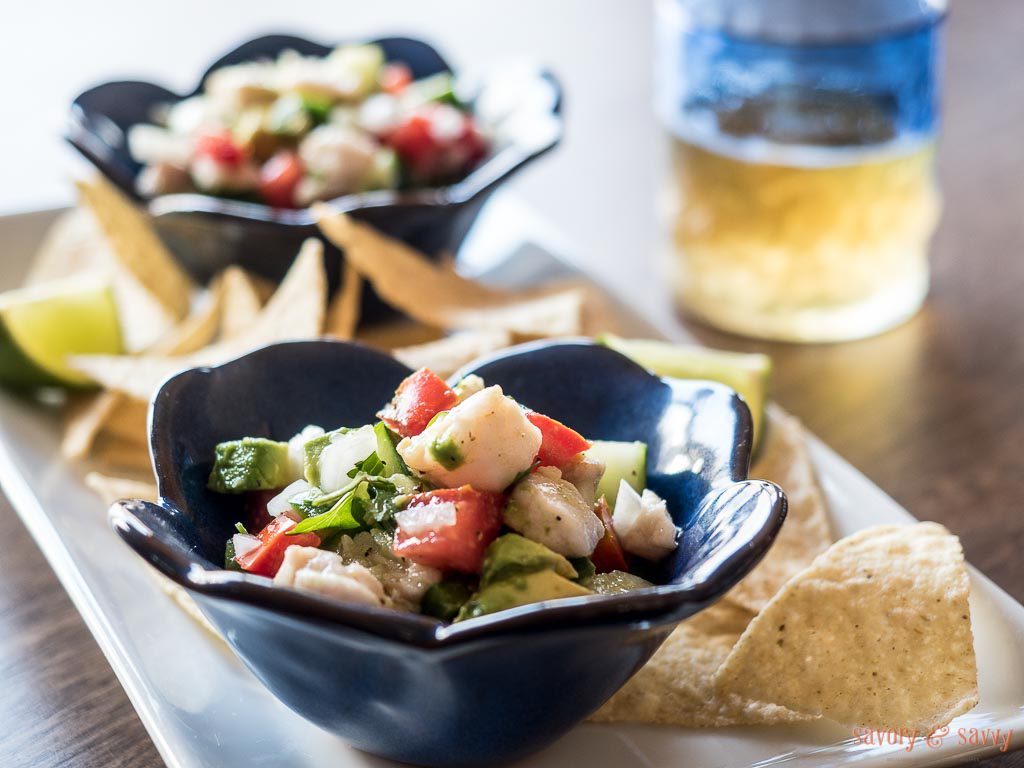When you invite guests over on a warm sunny day, there’s nothing like ceviche to delight the senses. Refreshing, yummy and light, it checks off all the boxes for a successful cocktail party.
The first time I traveled to France to meet Antony’s family, I discovered apéritif and fell in love with this concept. What is apéritif? Normally enjoyed before dinner or lunch, apéritif is a drink, usually alcoholic, served with light bites. Typically, “light bites” can be something simple like nuts or mini toast with various spreads which is what Antony’s dad prepared for us. During this France trip, we enjoyed aperitif every night before dinner and I enthusiastically informed Antony that this wonderful tradition will continue when we return home. He was thrilled, of course. 🙂
Apéritif is a recurring event in our home but not quite on a daily basis. We save it for special occasions or when guests come over.
It’s a fantastic way to entertain when I don’t have the energy to cook an elaborate meal. This idea of apéritif is taken up a notch by serving small dishes that are a bit heartier. Meals such as ceviche are perfect, especially on a hot summer (or Bay Area fall) day.
Ceviche is a fish or seafood dish marinated in lime or lemon juice and tossed with various fresh vegetables. If you want to know more about making ceviche, J. Kenji López-Alt explains in great detail here. I will highlight the basics.
Ceviche basics
The first key to ceviche is using fresh white ocean fish or seafood from a reputable vendor. (California Halibut, roughy, rockfish, sea bass are all great options). Avoid fresh water or oily fishes such as salmon, mackerel or trout.
While fish can be pricey there are inexpensive options. You’re also not alone in this. Ask your fishmonger for recommendations in your price range. I’ve certainly gotten lucky multiple times doing this which is also why I am loyal to certain fish markets. If you’re looking for a good fishmonger in the East Bay, I highly recommend Tokyo Fish Market in Berkeley or JP Fish Market in Alameda.
The second key to ceviche is chopping all the remaining vegetables the same size. It’s easier to eat and get the perfect bite with all the ingredients.
There are many endless variations of ceviche but I prefer this one which includes as many fresh vegetables as possible. It’s a fantastic way to use up garden or farmers market tomatoes and cucumbers when in season!
Entertaining should be easy and fun. And this ceviche recipe proves it.
So, the next time you want to impress your friends but don’t want to commit to cooking a full meal, invite them over for apéritif. All you need are fresh ingredients, sushi-quality fish and mad chopping skills to whip up this delicious ceviche recipe and your guests will rave about it. It was a big hit with Antony’s relatives!
Bon appetit and santé!
Ceviche
Ingredients
- 1 lb white ocean fish (ex. rockfish, roughy, seabass) ($10.00)
- 1 white onion, diced ($0.50)
- 1 large beefsteak tomato, deseeded and diced ($2.00)
- 1 Japanese or English cucumber, deseeded and diced ($0.00) from our garden
- 1 avocado, pitt removed and diced ($2.00)
- 1/3 cup fresh cilantro leaves, minced ($0.25)
- 10 limes, juiced ($1.00)
- 1 jalapeño, deseeded and diced ($0.25)
- 1 Tbsp salt plus more for seasoning ($0.03)
- Ground black pepper ($0.01)
Instructions
- Prepare all your ingredients.
- Remove all bones and skin from the fish and cut in medium cubes. Pour lime juice in a medium size glass pan. Add a good pinch of salt and mix. Spread fish out evenly until lime juice just covers the fish. Cover with plastic wrap and refrigerate for 15 to 30 minutes when fish becomes opaque.
- In the meantime, in a large bowl, combine all chopped ingredients except for the avocado. Cover with plastic wrap and refrigerate until fish is ready. Salt at the end since this will render water.
- Remove fish from the fridge and drain well in a colander with small holes so you don’t lose any fish. Don’t rinse with water. Set aside close by.
- Take the large bowl with chopped vegetables and add drained fish. Add diced avocados and gently stir to combine. Add salt and pepper to taste.
- Ceviche is best served cold. Serve right away with tortilla chips or tostadas along with a nice cold beer or white wine. Enjoy!
Recipe Notes
* Note regarding pricing: The cucumber used in this recipe are from our garden which is why there is no price listed. The price for other items such as salt and pepper take into account the cost of the amount used for the recipe and not the cost if you had to purchase the entire jar or bottle. ** All prices in US dollars and based on Bay Area prices from my local grocery and farmers market. Prices may vary in other parts of the United States.
